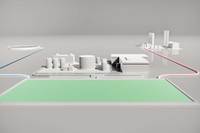Audi Partners With Joule To Make Future Mobility Fuels With Micro-organisms
SEE ALSO:Joule Pioneers Liquid Fuel from the Sun
By Henny Hemmes
Senior European Editor
The Auto Channel
THE HAGUE, January 9, 2013; In the quest to reduce fuel consumption and thus CO2 emissions of cars, Audi is developing synthetic natural gas, which the German car manufacturer refers to as Audi e-gas
But that is not all. Audi also wants to deal with the production of carbon-neutral e-ethanol and e-diesel by using micro-organisms.
In the not too far future e-ethanol and e-diesel could replace ethanol and bio-diesel from corn and oilseed rap, that have a good carbon foot print because the CO2 emission during incineration is not greater than what the plants produce during their growth. However, they do have an attack on the land available and the food chain.
But, a radically new solution is being under development. In 2011, Audi partnered with the American biotechnology firm Joule Unlimited for the use of micro-organisms for the production of synthetic fuels, e-diesel and e-ethanol. Joule produces fuels in a patented process that involves special micro-organisms in a highly scalable modular system.
Audi e-ethanol
The photosynthetic organisms are single cellular and three thousandths of a millimeter in diameter. They are among the oldest forms of life on our Earth. The process is relatively simple: the energy from the sun converts CO2 and brackish or sea water and the micro-organisms continuously produce more cells. This process is called photosynthesis, which Joules Unlimited has changed to have the micro-organisms produce ethanol or long-chain alkaline, an important component of diesel fuel.
The fuel is secreted by the organisms and then it is separated from the water, purified and concentrated. With this technology Audi e-diesel and e-ethanol have the same chemical properties as the bio-ethanol that is on the market. But the decisive advantage is that it is produced without biomass. It will be used as a blend with fossil fuel gasoline up to 85 per cent and suitable for vehicles that can use E85 fuel.
Audi e-diesel
Along with the e-ethanol project, Audi works with Joule to produce a sustainable diesel fuel. The strength of this product is its purity. In contrast to petroleum-based diesel, which is a mixture of a wide variety of organic compounds, this ‘drop-in’ fuel is free of sulfur and aromatics. The fuel is very easy to ignite thanks to the high cetane number, while its chemical composition permits unlimited blending with fossil-fuel diesel. The result will be a fuel that works well with the existing TDI clean diesel engines, without any additional automotive engineering challenges.
A test facility has been installed and production has been started up in the state of New Mexico, an unfertile region with a high level of sunlight. Joules has protected its technology with patents, for which Audi has acquired exclusive rights in the automotive field. Audi also gives technical support while its engineers with expertise in the field of fuel and engine test are helping to develop marketable fuels.
In the meantime, the first laboratory tests and tests with 1-cylinder engines have been successful. Audi plans to start commercialization in the beginning of 2014.
About Joule
Joule is advancing a technology platform for Liquid Fuel from the Sun™, expected to eclipse the scale, productivity and cost efficiency of any known alternative to fossil fuel today. Its trans-formative Helioculture™ platform directly and continuously converts sunlight and waste CO2 to infrastructure-ready diesel, ethanol or commodity chemicals with no dependence on biomass feedstocks, downstream processing or precious natural resources. Joule has successfully pilot-tested its platform for over two years, initiated operations at its SunSprings™ demonstration plant, and launched a global subsidiary, Joule Fuels, to deploy fuel production sites worldwide. At full-scale commercialization, Joule expects to deliver renewable fuels and chemicals in unrivaled volumes, at highly competitive costs, with a fraction of the land required for biofuels derived from agricultural feedstocks or algal biomass. Joule is privately held and has raised over $110 million in funding to date. The company is headquartered in Bedford, Massachusetts with operations in Leander, Texas; Hobbs, New Mexico; and The Hague, Netherlands. Additional information is available at www.jouleunlimited.com.


